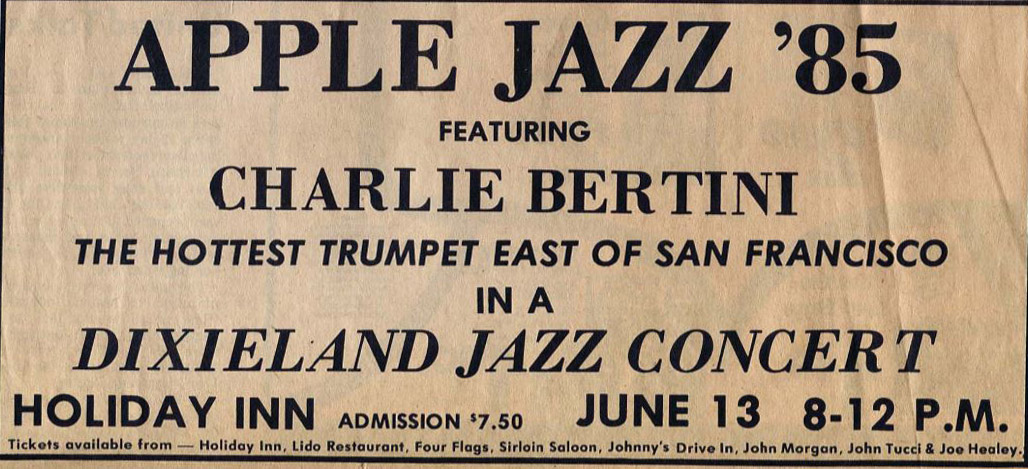Entertainment
APPLE JAZZ Owner Pursues Cancellation of APPLE Mark for Entertainment Services in District Court

“Bertini alleges that no entertainment services under the APPLE mark were advertised during the relevant period of November 2011 to May 2015.”
Source: TTAB documents
On June 7, professional trumpet player Charles Bertini filed a lawsuit in the Northern District of California seeking the cancellation of trademark rights owned by consumer tech giant Apple covering the use of the company’s name in connection with entertainment services. Bertini’s lawsuit is the latest effort in his nearly decade-long battle to obtain a federal trademark registration for APPLE JAZZ, a mark which Bertini has used to market live entertainment since 1985.
Opposition Proceeding Lacked Bearing on Cancellation Despite TTAB Stay
Bertini’s application to register his common law mark for APPLE JAZZ, filed in June 2016, was refused due to a likelihood of confusion with Apple’s service mark APPLE and trademark application for APPLE MUSIC. Bertini and Apple’s marks were each filed within Class 41 for entertainment services. Although the U.S. Court of Appeals for the Federal Circuit ruled in April 2023 that Apple was not allowed to claim absolute priority for each of the services listed in its applications, the Trademark Trial and Appeal Board (TTAB) this March struck down Bertini’s petition to cancel APPLE in Class 41 for failure to make a prima facie showing of abandonment.
Bertini appealed, but Apple filed a seldom-used Notice of Election at the Federal Circuit, which cancelled the appeal, and Bertini said put them in the position of having to file suit to cancel in a district court in order to challenge the TTAB decision.
The Federal Circuit’s April 2023 ruling followed Bertini’s appeal from the TTAB’s dismissal of his separate opposition to APPLE MUSIC. Although Bertini first filed his petition to cancel APPLE in March 2018, notifying the TTAB of the opposition as a related proceeding, the cancellation was only suspended by the TTAB due to its relation to the APPLE MUSIC opposition in February 2022, one year after the cancellation was marked as submitted for final decision on the TTAB’s docket.
Although the TTAB did not view Bertini’s opposition to APPLE MUSIC as having any bearing on the APPLE cancellation proceeding, Bertini’s recent lawsuit notes that Apple did not introduce evidence during the opposition that its APPLE mark, which Apple attempted to tack onto its APPLE MUSIC application, was used for advertising or sales of entertainment services as identified in the APPLE registration. While Apple filed its application to register APPLE in Class 41 back in March 2008, Bertini alleges that no entertainment services under the APPLE mark were advertised during the relevant period of November 2011 to May 2015, supporting Bertini’s abandonment challenge. Entertainment services marketed by Apple during the relevant period were primarily advertised under the company’s ITUNES mark, including the live iTunes Music Festival held from 2007 to 2014; the event was produced as the Apple Music Festival in 2015 and 2016.
Bertini Alleges Prima Facie Evidence of Abandonment and Fraudulent SOUs
In seeking cancellation for abandonment, Bertini alleges that the APPLE mark did not operate as a service mark for three years and six months following the statement of use (SOU) in the APPLE mark’s application. Usages of APPLE on the company’s website and other promotional material solely functioned as a trade name, Bertini contends. Under 15 U.S.C. § 1127, nonuse for three consecutive years operates as prima facie evidence of abandonment, and Bertini asserts that Apple’s entertainment services were marketed during the relevant period under its separate ITUNES mark.
Bertini further seeks cancellation of APPLE in Class 41 for fraudulent procurement pursuant to 15 U.S.C. § 1064. Repeating allegations that the mark was not properly used to market Apple’s entertainment services, Bertini argues that Apple’s SOU filed in November 2011 was a false representation of material fact. Extensive research of Apple’s use of its corporate name conducted by counsel for Bertini was allegedly unable to uncover any use in commerce of APPLE prior to and following the SOU.
Bertini’s lawsuit also includes a pair of counts of relief to cancel APPLE for fraud in the maintenance of the mark. The first count for fraudulent maintenance focused on an August 2018 response to office action filed by Apple claiming use of the mark in the registration’s identified services. That response followed a post-registration office action from February 2018 selecting the APPLE mark for auditing and seeking proof of use for the services identified in Apple’s registration. The second fraudulent maintenance count centers on a January 2018 statement from Apple in a declaration of use and incontestability, which again made the allegedly false representation that the APPLE mark was used with entertainment services. These statements to renew Apple’s registration in the contested mark constitute fraud that has damaged Bertini in his pursuit of the APPLE JAZZ mark, which arguably makes Apple liable to Bertini for damages.










